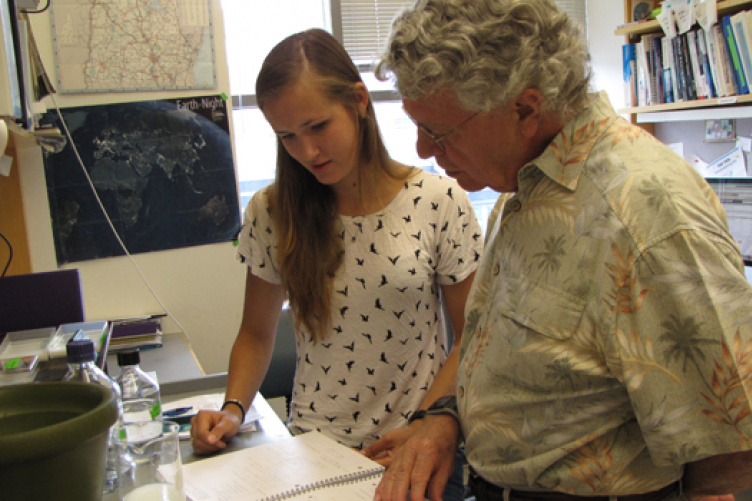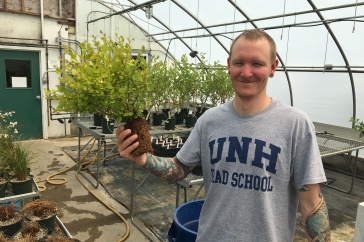
Professor of Molecular, Cellular, and Biomedical Sciences Chuck Walker ponders a long list of successful alumni who once conducted research at his side in the Walker Lab. Sure to be among them is Caelie Kern '16, a Neuroscience and Behavior major in the College of Life Sciences and Agriculture (COLSA) at the University of New Hampshire (UNH), who is currently assisting Walker with his research on the protein p53's role in the development of cancer. "Caelie's last name means nucleus in German," muses Walker, aware of how apropos her family name is to her current research and career ambition as an oncologist.
The impressive, relevant research opportunities for COLSA undergraduates and the proven long term success of Walker's students were important factors in his recent proposal for funding, from the U.S. Department of Health and Human Services' National Institutes of Health National Cancer Institute, to study Human Acute Myelogenous Leukemia (AML). Garnering such grants is challenging, and Walker and his team—including physician and professor of medicine at the University of Pennsylvania, Dr. David Claxton—were excited to discover that their proposal received an impressive priority score of 16. Ultimately, they were awarded $349,642 over a two-year period in support of their collaborative cancer research.
A motivated honors student, Kern obtained both a Research Experience and Apprenticeship Program scholarship as a freshman and a Summer Undergraduate Research Fellowship during her sophomore year from the Hamel Center for Undergraduate Research in support of her work in the Walker Lab. "I'm investigating an AML cell line, and samples from a clinical population of AML patients, to determine whether or not a complex exists between the cell proteins p53 and mortalin [a protein that could tether p53 in the cytoplasm and inactivate it]," says Kern. She eloquently describes p53 as the guardian of the genome and explains how it normally travels to the nucleus to affect gene expression. This induces proteins that scout for DNA damage and attempt to repair that damage and induce apoptosis (cellular suicide) in severely damaged cells. "When p53 is inactivated, cancer can flourish since cells don't die," says Kern who is also assisting Walker in determining if mortalin—the protein that could be responsible for tethering p53 in the cytoplasm of AML cells—may play a role in inhibiting cell death.
In the Walker Lab, Kern examines blood samples from patients to determine the percent of the clinical population that exhibits p53 cytoplasmic sequestration. It is the collaboration with Claxton, who is responsible for the care of patients with hematological malignancies and leukemia treatments, that allows Walker and his lab personnel access to blood samples for testing the effects of various drugs and herbal medicines. "A lot of chemotherapy drugs are very broad spectrum and have pretty devastating effects," says Walker who is also investigating the action of Withanone, an herbal medicine from India. Whether treatment is derived from natural or pharmaceutical origins, Walker says, "We're interested in the transcriptional functions of p53 in the nucleus and the generation of proteins that cause the cell to undergo apoptosis since cancer cells try to develop ways to avoid apoptosis."
Kern notes that Walker has been a great influencing factor in helping her to develop her enthusiasm for scientific research. "His passion in talking about cells and intracellular process really piqued my interest during my biology class in freshman year," says Kern. "I love cells, too. They are so detailed and intricate, and I find it fascinating that they control everything we do." As a young researcher, Kern is honored to work on a project that can make a real difference in the lives of people who suffer from Acute Myelogenous Leukemia.
Written by Victoria Forrester Courtland

















































